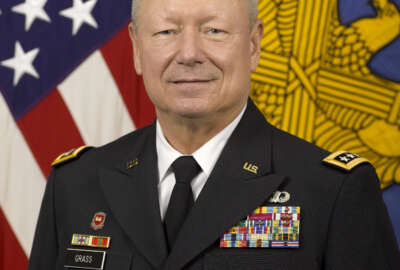
Air Force Reserve playing catch up on cyber training
With the demand for cyber skills high, the Air Force Reserve is trying to stay afloat.
As the Defense Department ramps up its need for service members with cyber skills, the Air Force Reserve is trying to keep up with the demand.
Defense Secretary Ash Carter stated his intentions to invest $35 billion into cyber over the next five years. That includes setting up 133 teams of Cyber Mission Forces by the end of 2018.
Those forces will be tasked with defending DoD networks, protecting U.S. cyberspace and providing cyber support to military operations.
In order to staff that demand, the Air Force reserve is amping up cyber training for its service members.
But despite the need for cyber troops, the Air Force Reserve currently does not have the training capacity to school the amount of service members needed. That forces reservists to wait for their cyber training.
“We have just enough instructors and the training pipeline is a certain size right now,” Lt. Gen. James Jackson, the chief of the Air Force reserve said in an interview with Federal News Radio.
As of September 2015, the Air Force Reserve had about 2,300 “cyber warriors” and 11 cyber units. The reserve will grow three new units in 2017.
The active-duty Air Force and the Air National Guard get first priority for cyber training, pushing the dates reservists can start training further back, said Jackson.
The National Guard said it has a cyber training backlog.
Jackson said he also has reservists waiting for cyber training, but could not specify exactly how many.
“I wouldn’t call it a backlog. What we do is we take out members and we assign them to the units and then we put them in what is called Developmental Training Flight so that they are not just hanging out and not doing anything. They are actually learning about the Air Force and also learning about the unit that they are going to come back to after they finish their training,” Jackson said.
The Air Force Reserve is taking measures to expedite reservist training by making one of the cyber units it sets up in 2017 a training unit.
Jackson said Hurlburt Air Field in Florida is putting through as many reservists as possible to get them mission qualified for cyber.
The new unit will be set up in Hurlburt as well.
“They are doing shift work and everything they can to make the throughput work out. We are going to do an association on that [training] organization so that our manpower can help improve the quality of life at that location and make sure that the students are getting all the training that they need,” Jackson said. “It’s going to be additional part-time and full-time manpower to do mission qualification training for cyber.”
Students going through the cyber training need a Cyber Warfare Operator Course, which takes 85 days, a cyber defense and control operation course, which takes 32 days and Air Force cyber defense system training, which takes two weeks. From there they take mission qualification training, which can last 90 days.
It can take 18 months for students to fully get through the pipeline.
Air Force reservists and Air National Guard members have the potential to be ideal cyber service members because of the training they may get in the private sector.
Reservists and Guard members who only work part-time may have cyber jobs in their private lives.
The problem is the military still requires them to go through the military’s version of cyber training.
Jackson called on Congress to create a waiver program so those certified in the private sector won’t have to do it again.
“What we are attempting to do…is make sure that type of training can be counted towards military training also where it applies,” Jackson said. Congress already approved constructive credit for active duty military.
Copyright © 2025 Federal News Network. All rights reserved. This website is not intended for users located within the European Economic Area.
Scott Maucione is a defense reporter for Federal News Network and reports on human capital, workforce and the Defense Department at-large.
Follow @smaucioneWFED



